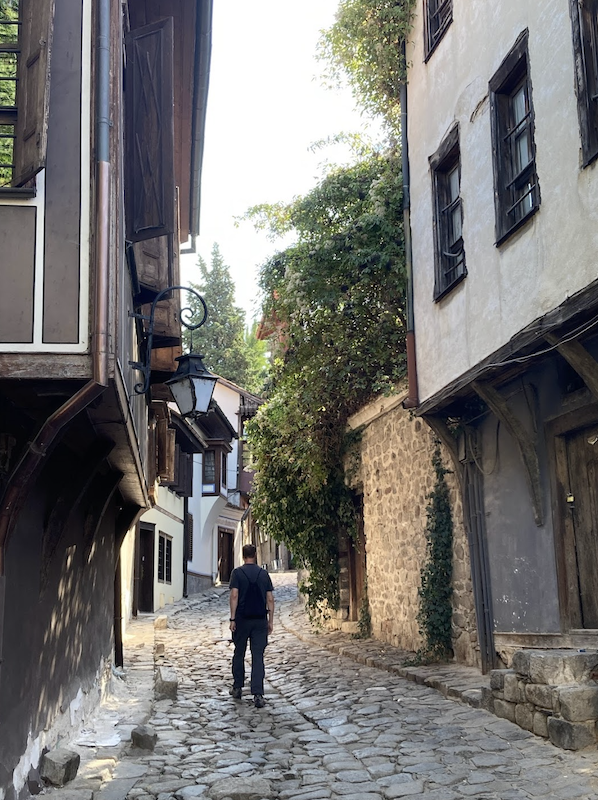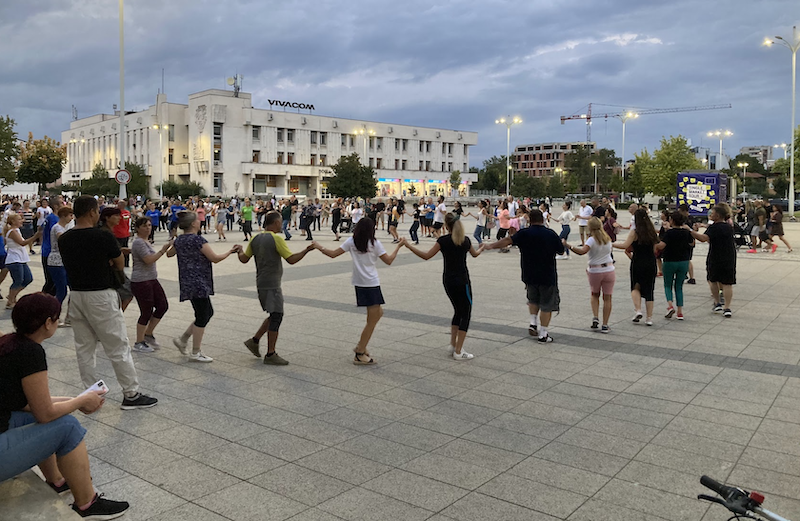I started writing this on a train from Plovdiv to Sofia, kept on writing on a plane, then on a balcony in Athens overlooking a tangle of other balconies. I spent a month in Bulgaria, and now that I’m looking at it from another place and culture, I’ve finally reached a kind of answer to that question, often posed before we came.
Which is that it’s a terrible question.

Not, mind you, your terrible question. If you asked it, please know that I asked it first. Multiple times. But it’s a question I became more uncomfortable with as my weeks in Bulgaria went by.
Because, I mean, of course Bulgaria. Their fascinating political history is unlike any other. They have their own alphabet and language and struggle to save them–which they have done against great odds and centuries of oppression. They have their Bulgarian Orthodox priests and National Revival heroes, their poets and artists, their old women walking to market and neighbors drinking coffee in the square and couples pushing strollers past memorials to their war dead. To ask Why Bulgaria? after you’ve been there for a while feels nonsensical.
One could, perhaps, make a value judgment on whether the food is better in Italy or the scenery is superior in, say, Switzerland, and I suppose there may be some kind of jaundiced point to be made there on that kind of narrow gauge of tourism. (Judging whether to visit a country like that reminds me of that scene near the end of Dead Poets Society when the school master has the beleaguered boys rate poetry on an x/y axis.) But I assure you, you will not think of Italy or Switzerland or anywhere else while you’re drinking rakia on a weekend night as a youthful Plovdiv pulses around you, a city that’s been there for 6000 years. Bulgaria is a country that feels both utterly in the moment and outside of time.

Bulgarians keeping folk dancing alive every Sunday evening at the end of the pedestrian street in Plovdiv. Reminders of struggles are in all directions: that’s the Soviet-era post office. Near that is the monument to those who died under Communism, and near that is a monument to heroes who rose up against the Ottoman Empire. Through it all, they decided to keep dancing.
I thought about the nature of time a lot in Bulgaria. In Jenny O’Dell’s book Saving Time, where she explores historical perspectives on timekeeping, time management, and our relationship to time, she asks, “instead of hustling to live your best life…[w]hat about choosing to live just a life?”
This question feels even more pertinent while traveling, when I can hear more clearly the rhythm that space and time beat out together. I realized that when I asked Why Bulgaria? I was asking for those weeks of travel to be optimized, to be productive, to prove their value over some other use, some other destination.
To go to Bulgaria is, maybe, a small step toward reclaiming time, toward refusing to make time perform for you, or you for it.
Go to Bulgaria so you can stroll, with only a vague idea where you are headed, along twisting cobblestone streets where sidewalks randomly appear and disappear.
Go to Bulgaria to have a museum of breathtaking 7000-year-old artifacts all to yourself on a Tuesday afternoon.
Go to Bulgaria to weep when you hear the queer, echoing half-notes of a folk tune from the Rhodopes. Even though the singer is in the bloom of youth with long glossy black hair, she remembers the old songs. Because she’s Bulgarian, and Bulgarians are serious about being Bulgarian.
Sure, go to Bulgaria to ski in Bansko or lay on the beach in Varna, or, in our case, to take a beautiful hike along a Roman road between Asenograd and Bachkovo. But don’t only do those things. Go for long enough to resist making demands of time, and maybe even get lost in it.
Thanks for reading, and by the way, I love comments. Bookmark fieldtripnotebook.com for more on self-guided journeys, minimalism, and life of full-time travel. For daily postcards from, well, wherever we are, subscribe to launaatlarge.substack.com. Justin’s insightful writing on personal finance, early retirement, and minimalism is at Living the FIgh Life.
